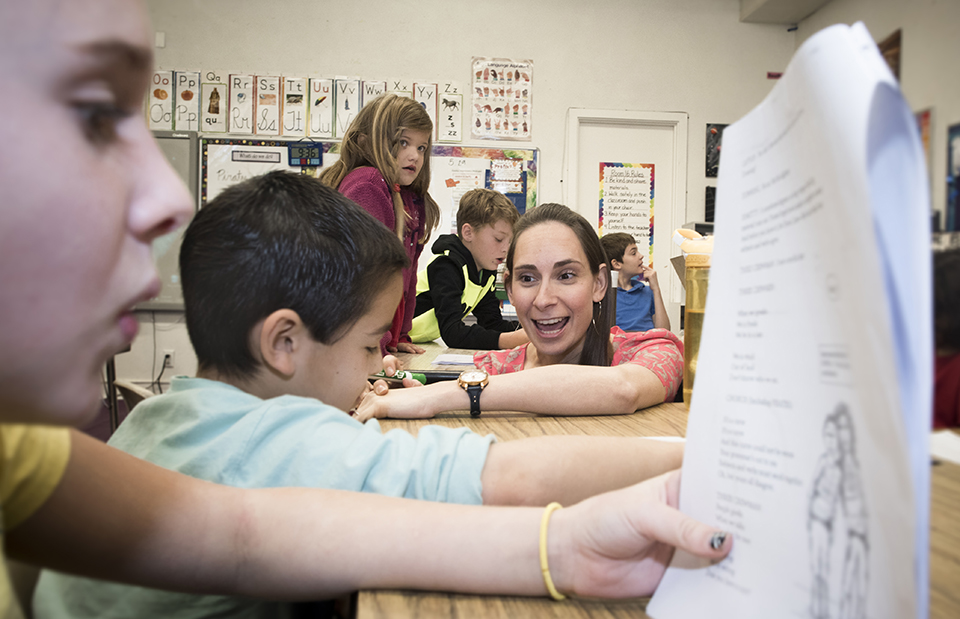CSUN Program Offers ‘Residency Grants’ to Future Teachers

CSUN’s Michael D. Eisner College of Education is offering “residency grants” to those interested in becoming teachers in hard-to-fill fields — special education and middle and high school science and math teachers — and are committed to working in high-need schools. Photo by Lee Choo.
To be a good teacher, one has to spend time in a classroom mastering the art of lesson planning; creating innovative and engaging classwork that moves students forward academically; adapting curriculum to meet individual needs; grading tests; meeting district and state standards; navigating academic bureaucracy; and diplomacy.
To give future teachers that experience, California State University, Northridge’s Michael D. Eisner College of Education is offering “residency grants” to those interested in becoming teachers in hard-to-fill fields — special education and middle and high school science and math teachers — and are committed to working in high-need schools.
“The idea of the residency grants is similar to that of a medical residency, only with a financial incentive,” said Julie Gainsburg, chair of CSUN’s Department of Secondary Education. “The ‘resident’ student teachers will be embedded in a high-need school for one year while working on their credential and will receive financial support to help offset the fact that they, more than likely, will not be able to hold down another job while they are in training.”
Special education professor Nancy Burstein said the residency program builds on the college’s acclaimed Accelerated Collaborative Teacher (ACT) Preparation Program. ACT is an intense, two-semester program that allows teacher candidates to accomplish the entire credentialing process — including student teaching — and focuses on addressing the unique and diverse needs of K-12 students in urban schools.
The residency program, called ACT-R, is similar to the original program, but requires a one-year student teaching commitment at a high-need school. It also provides a grant, or stipend, to support the teacher candidate during the student-teaching year, said Burstein, director of the ACT and ACT-R programs. Eligible students can receive stipends of $15,000.
The stipends are funded through a partnership with the Los Angeles Unified School District, which promises those who complete the program priority in hiring into the district. In exchange for the financial support, the new teachers commit to working at high-need schools for four years.
There are currently 23 students in the ACT-R program — 15 of them training to become special education teachers and eight training as math or science middle or high school teachers.
“The students will spend their yearlong residency working alongside teachers trained as mentors and will co-teach with their mentors in schools that model effective practices with diverse learners,” Burstein said.
As with all the credential programs in CSUN’s Michael D. Eisner of Education, those who complete the one-year program will receive ongoing mentoring and support, she added.
The California State University system also is making available scholarships of up to $10,000 to financially eligible CSUN students in the regular ACT program. The Teacher Residency Scholarship Program was established for CSU students enrolled in programs that meet the quality standards set by the New Generation of Educators Initiative, which was launched by the CSU as a way to help teacher candidates — under the supervision of mentor teachers — connect the knowledge and skills they learn in the classroom with the challenges of putting them to use with children in schools.
There are 19 elementary, secondary and special education teacher candidates at CSUN who have received the scholarship.
Teacher candidates progress through the ACT and ACT-R programs as a cohort, completing a residency year with a mentor or mentors in high-need schools and coursework in the late afternoon and evening.
“They are truly intense programs that demand an incredible time commitment of those participating,” Gainsburg said. “Trying to hold a job while going through this would be nearly impossible. While we know the scholarships and stipends cannot replace the salary a job produces, I hope they will at least lessen the burden a little while our students learn what they need to fulfill their dreams of becoming teachers.”

 experience
experience